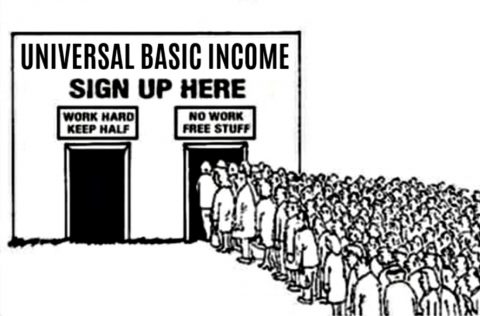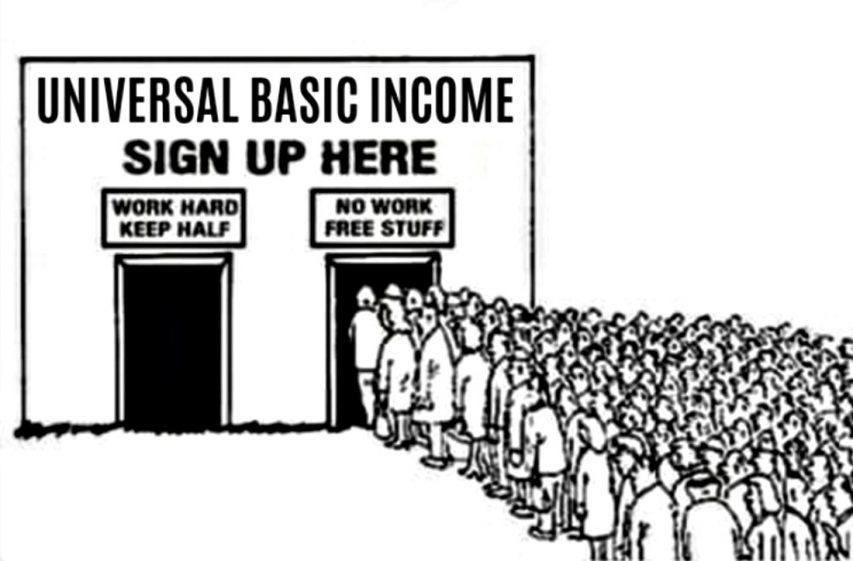Feral Historian
Published 14 Jun 2024So the Federation doesn’t use money and magic walls give you anything you ask for. What kind of economy are we really looking at here, and is some approximation of this possible without first having those replicators?
First we have to talk about what money is, what a job is (vs just being employed) and a little historical detour into modern efforts at Universal Basic Income. All of which lead to a very hypothetical look at how we might be able to build a rough approximation of a Star Trek economy in the near-term future.
This is all analysis and thought-experiment. I’m not necessarily endorsing any of these ideas, just bouncing things around for consideration.
00:00 Intro
01:00 Qualitatively Distinct Model
02:27 The Triple Revolution
05:00 Jobs ≠ Employment
06:32 Universal Basic Income
11:35 Federation Credit
13:45 Impacts of Currency
15:16 Can We Really Do This?
(more…)
March 21, 2025
Star Trek: Jobs, Money, and Replicators
November 2, 2024
QotD: UBI discourages low-income workers
Not only does it have a high cost, UBI drains the labour force by discouraging work and boosting leisure time, says one big-picture study
Earlier this month, a cross-border team of North American economists published the results of a landmark study, probably the best and most careful yet done, of how low-income workers respond to an unconditional guaranteed income. Not so long ago this would have been a plus-sized news item in narcissistic Canada, for the lead author of the study is a rising economics star at the University of Toronto, Eva Vivalt. The economists, working through non-profit groups, recruited 3,000 people below a certain income cutoff in the suburbs of Dallas and Chicago. A thousand of these, chosen at random, were given a thousand dollars a month for three years. The rest were assigned to a control group that got just $50 a month, plus small extra amounts to encourage them to stay with the study and fill in questionnaires.
That randomization is an important source of credibility, and the study has several other impressive methodological bona fides. If you have an envelope to scribble on the back of, you can see that the payments alone were beyond the wildest dreams of most social science: most of the money was provided by the AI billionaire Sam Altman. But the study also had help from state governments, who agreed to forgo welfare clawbacks from the participants to make sure the observed effects weren’t obscured by local circumstances. Participant households were also screened carefully to make sure nobody in them was already receiving disability insurance. (Free money doesn’t discourage work among people who can’t work — or who absolutely won’t.) And the study combined questionnaire data with both smartphone tracking and state administrative records, yielding an unusually strong ability to answer difficult behavioural questions.
The big picture shows that the free cash — a “universal basic income” (UBI) for a small group of individuals — discouraged paying work, even though everybody in the study was starting out poor. Labour market participation among the recipients fell by two percentage points, even though the study period was limited to three years, and the earned incomes of those getting the cheques declined by $1,500 a year on average. There is no indication that the cash recipients used their augmented bargaining power to find better jobs, and no indication of “significant effects on investments in human capital”, i.e., training and education. The largest change in time use in the experiment group was — wait for it! — “time spent on leisure”.
Colby Cosh, “Universal basic income is a recipe for fiscal suicide (for so many reasons)”, National Post, 2024-07-30.
June 30, 2020
In the final analysis, there is only one taxpayer – you
Ted Campbell comes out in favour of some form of negative income tax for Canada:

Cartoon that appeared with Michael K. Spencer’s article “Is Universal Basic Income really a solution?” at https://medium.com/@Michael_Spencer/is-universal-basic-income-really-a-solution-c0d6d95f100e
My first and, I believe, the most important thing to understand about taxes is: there is only one taxpayer; it is you and me and individuals like us. Corporations do not pay taxes ~ they pass every single penny of the taxes assessed to them on to us, their customers. You and I and your and my family and friends pay 100% of all corporate taxes.
A tax on income is a tax on savings which is, in turn, a tax on investment which means it is a tax on jobs.
Flate rate taxes are unfair to the poor, but progressive income taxes, while fairer, take money away from investment in jobs.
Consumption taxes (sales taxes and the HST/GST) are, to some extent, voluntary: consume less and you pay less in taxes. Where consumption is not discretionary ~ say on food ~ the tax system may be used to make consumption taxes at least somewhat progressive.
Corporate taxes ~ ALL corporate taxes ~ are just consumption taxes that are collected in an inefficient and expensive manner. It would be much, much better tax policy to raise the federal GST by 1 or 2 points and cancel ALL corporate taxes. Having a zero federal corporate tax rate would make Canada a much, much more attractive place in which to do business; companies would want to open plants and offices here ~ meaning more, new, good jobs for Canadians.
Income taxes have far too many exceptions and exemptions and deductions and so on. Federal income taxes should be clear and simple and the Canada Revenue Agency should be able to automatically provide a tax bill to about 98% of Canadians. That may mean a thorough (and time-consuming and politically unpopular) overhaul of the complete tax system.
August 19, 2019
April 10, 2019
QotD: UBI and the “end of work”
I’m sort of skeptically agnostic about the end of work. Yes, this has been predicted before, and never arrived. On the other hand, history is full of stuff that was predicted and didn’t arrive, until suddenly it did. So maybe this time is really different.
And what do we do if it is? I don’t know. I don’t think UBI [Universal Basic Income] is the answer. We have a fair amount of data about what places look like where large numbers of people are subsidized not to work. The answer is “like nowhere you’d want to live”. The predicted flowering of artistic and community endeavor does not arrive; people are depressed, less social, and spend a great deal of time on activities like watching television.
To this, UBI advocates rejoinder “But what about trust fund babies and old-style aristocrats! Everyone admires their lives of leisure!” To which my answer is “Heck no, I don’t”. The lives of the idle rich are better upholstered than the out-of-work poor, but suffer the same absence of meaning and community. They are not a model to which anyone should aspire.
Megan McArdle, “Ask Me Anything”, Reddit, 2017-04-10.
March 12, 2019
A choice between a (small) UBI and not taxing the poor at all
Tim Worstall responds to an article advocating abolishing Britain’s tax-free personal allowance and replacing it with a form of universal basic income (UBI):
Sure, we need to have government, even if not quite as much as we do have. Thus we need tax revenues to pay for it. But that tax should be, where it is derived from income, paid by the better off among us. As Adam Smith pointed out, people should be paying more than in proportion to their income. I would actually argue that income tax should only kick in at median income but agree that would require a smaller state than we’ve got now. Actually, that’s why I would propose it.
Still, that does mean that this suggestion fails at that first hurdle:
The tax-free personal allowance, which rises to £12,500 in April, should be scrapped and replaced with a flat payment of £48 a week for every adult, according to radical proposals welcomed by shadow chancellor John McDonnell. The proposal, from the New Economics Foundation thinktank, is for a £48.08 “weekly national allowance,” amounting to £2,500.16 a year from the state, paid to every adult over the age of 18 earning less than £125,000 a year. The cash would not replace benefits and would not depend on employment.
It’s a universal basic income. Excellent stuff therefore. But the error is to think that this should replace that personal allowance. Assume that they’re including NI in that no allowance thing – if they’re doing it for income tax then they probably will for NI. What that means is that anyone earning more than £50 a week is facing a 40% marginal tax rate (yes, 40%, employers’ NI is incident upon the workers’ wages).
Do we think that’s a just way to pay for diversity advisers? That someone on £50 a week gives up 40% of any income over that? No, we don’t, we think that’s an entirely unjust taxation system. Actually, it’s a really stercore* taxation system.
* Someone’s been at his Latin texts again … I had to look this word up myself. It’s the ablative singular form of stercus, which means “manure, dung; to sully, soil, decay”, according to Wiktionary.
August 3, 2017
Words & Numbers: Is UBI Better Than Welfare?
Published on 2 Aug 2017
A viewer recently asked us what Words & Numbers thought of Universal Basic Income.
Antony Davies likes the idea of it, provided it’s done well, but doesn’t think it could ever possibly be done well. But what about a theoretical UBI? If we could actually figure out how to implement that well, would that work? And why wouldn’t that work in the real world? This week on Words and Numbers, Antony and James R. Harrigan tackle the issue that’s getting a lot of attention in Silicon Valley.
August 2, 2017
Some troubling early signs from Finland’s UBI experiment
Dan Mitchell says we can’t draw definite conclusions from these early (anecdotal) points, but that it may point toward UBI (universal basic income) not being the panacea it’s been touted to be:
The New York Times published an in-depth preview of Finland’s experiment late last year. Here’s a description of the problem that Finnish policymakers want to solve.Map of Finland (Suomen kartta) by Oona Räisänen. Boundaries, rivers, roads, and railroads are based on a 1996 CIA map, with revisions. (via Wikimedia)
… this city has…thousands of skilled engineers in need of work. Many were laid off by Nokia… While entrepreneurs are eager to put these people to work, the rules of Finland’s generous social safety net effectively discourage this. Jobless people generally cannot earn additional income while collecting unemployment benefits or they risk losing that assistance. For laid-off workers from Nokia, simply collecting a guaranteed unemployment check often presents a better financial proposition than taking a leap with a start-up.
For anyone who has studied the impact of redistribution programs on incentives to work, this hardly comes as a surprise.
Indeed, the story has both data and anecdotes to illustrate how the Finnish welfare state is subsidizing idleness.
In the five years after suffering a job loss, a Finnish family of four that is eligible for housing assistance receives average benefits equal to 73 percent of previous wages, according to data from the Organization for Economic Cooperation and Development. That is nearly triple the level in the United States. … the social safety net … appears to be impeding the reinvigoration of the economy by discouraging unemployed people from working part time. … Mr. Saloranta has his eyes on a former Nokia employee who is masterly at developing prototypes. He only needs him part time. He could pay 2,000 euros a month (about $2,090). Yet this potential hire is bringing home more than that via his unemployment benefits. “It’s more profitable for him to just wait at home for some ideal job,” Mr. Saloranta complains.
So the Finnish government wants to see if a basic income can solve this problem.
… the Finnish government is exploring how to change that calculus, initiating an experiment in a form of social welfare: universal basic income. Early next year, the government plans to randomly select roughly 2,000 unemployed people — from white-collar coders to blue-collar construction workers. It will give them benefits automatically, absent bureaucratic hassle and minus penalties for amassing extra income. The government is eager to see what happens next. Will more people pursue jobs or start businesses? How many will stop working and squander their money on vodka? Will those liberated from the time-sucking entanglements of the unemployment system use their freedom to gain education, setting themselves up for promising new careers? … The answers — to be determined over a two-year trial — could shape social welfare policy far beyond Nordic terrain.
The results from this experiment will help answer some big questions.
… basic income confronts fundamental disagreements about human reality. If people are released from fears that — absent work — they risk finding themselves sleeping outdoors, will they devolve into freeloaders? “Some people think basic income will solve every problem under the sun, and some people think it’s from the hand of Satan and will destroy our work ethic,” says Olli Kangas, who oversees research at Kela, a Finnish government agency that administers many social welfare programs. “I’m hoping we can create some knowledge on this issue.” … Finland’s concerns are pragmatic. The government has no interest in freeing wage earners to write poetry. It is eager to generate more jobs.
As I noted above, this New York Times report was from late last year. It was a preview of Finland’s experiment.
[…]
Maybe I’m reading between the lines, but it sounds like they are worried that the results ultimately will show that a basic income discourages labor supply.
Which reinforces my concerns about the entire concept.
Yes, the current system is bad for both poor people and taxpayers. But why would anyone think that we’ll get better results if we give generous handouts to everyone?
- We already know that unemployment benefits discourage people from working.
- We already know that food stamps discourage people from working.
- We already know that Obamacare discourages people from working.
- We already know that disability payments discourage people from working.
So if we replace all those handouts with one big universal handout, is there any reason to expect that somehow people will be more likely to find jobs and contribute to the economy?
Again, we need to wait another year or two before we have comprehensive data from Finland. But I’m skeptical that we’ll get a favorable outcome.
June 15, 2017
Words & Numbers: What You Should Know About Poverty in America
Published on 14 Jun 2017
Poverty is a big deal – it affects about 41 million people in the United States every year – yet the federal government spends a huge amount of money to end poverty. So much of the government’s welfare spending gets eaten up by bureaucracy, conflicting programs, and politicians presuming they know how people should spend their own money. Obviously, this isn’t working.
This week on Words and Numbers, Antony Davies and James R. Harrigan delve into how people can really become less poor and what that means for society and the government.
March 27, 2017
UBI as “trust-fundism” writ large
In City Journal, Oren Cass discusses the suggested Universal Basic Income:
The UBI’s implications are clear from a family perspective. Imagine promising your child a basic income beginning at age 18. This is not just providing support — most parents already do that. Within the constraints of their own resources, they may give their young-adult children assistance with educational costs and even the down-payment on a first home; other government programs already seek to offer such support to those with lower incomes. But the UBI goes well beyond that, to an unconditional, irrevocable right to receive the cash for meeting basic needs: basically, the ultimate handout, not a hand up. A child would not receive payments himself, but he would grow up expecting them in a culture that endorsed them.
So if a parent wants the UBI experience for his children, he should not only promise the payments but also envision having “the UBI talk” with each one at least once a year, beginning no later than age 10. It could go something like this:
Son, it is important to me that you not feel obligated to support yourself. That’s my job. Nor should you feel a duty to be a productive member of society. It is a central principle of this family, rather, that you feel entitled to everything you need.
I hope you will get a job, because I think you will find it fulfilling, and it will allow you to buy nicer things. I also hope my support will encourage you to take some extra risks and pursue a challenging career, or become an entrepreneur, or dedicate yourself to helping those less fortunate. But none of that is a condition of my support. You can also backpack through Europe indefinitely or just sit in the basement smoking pot. In fact, as soon as we are done with this talk, let’s go watch one of the many movies Hollywood has produced recently in which they show the enormous benefits of those choices and viciously mock anyone who frowns on them.
If you find a girlfriend, I’ll be happy to double your payment. If you have kids, the payment will increase further. But lest you feel tied down, rest assured that you can break up, abandon the kids, and I’ll continue making payments anyway. And we’ll start those payments as soon as you turn 18, at a critical inflection point in your future.
Of course, some parents do provide their children with a system of automatic support. We call the result a “trust-fund baby.” The term is not usually synonymous with “kind, well-adjusted, productive member of society.” The day when parents embrace trust-fundism as a child-rearing ideal is the day when the UBI will gain mainstream traction as a public policy.
If the UBI’s advocates really believe in the policy, they should start with their own children. Granted, the “what about your own kids?” argument is usually a cheap rhetorical ploy. Advocates of foreign intervention don’t eagerly send their children into battle, nor do advocates of higher taxes voluntarily pay higher taxes themselves; they don’t claim that fighting wars or paying taxes benefits the individual, but rather that society as a whole would benefit. A policymaker might rationally enroll his children in private school while pursuing a public school model of education reform, or sign up his family for better health insurance than he believes the government should guarantee to all, without necessarily being hypocritical. What’s best for one’s own child need not align with the public policy one believes most appropriate for the government to adopt.
February 1, 2017
December 5, 2013
The unhappy math that undermines the Guaranteed Income notion
Megan McArdle is convinced that despite the appeal, any form of guaranteed income is doomed to fail. She provides four strong reasons for this, but I think the strongest reason is sheer mathematical impossibility:
Not a few libertarians have embraced the idea as an alternative to the welfare state. Get rid of all the unemployment insurance and just cut everyone a check once a month. There’s a lot to like about this: It has minimal overhead, because you don’t need to verify eligibility beyond citizenship, and it may reduce some of the terrible incentives that poor people face under the current system.
There are a couple of problems with this, however. The first is that zeroing out our current income security system wouldn’t provide much of a basic income. Total federal spending on income security (welfare, unemployment, etc.) is under $600 billion a year. There are 235 million adults in the U.S. Millions of those are undocumented immigrants, but that still leaves you with a lot of people. Getting rid of all of our spending on welfare and so forth would be enough to give each of those people less than $3,000 a year. For a lot of poor people, that’s considerably less than what they’re getting from the government right now.
The problem is that if you try to bring it up to something a bit more generous, the cost quickly escalates. Cutting everyone a check for $1,000 a month, which most people in that room would consider too little to live on, would cost almost $3 trillion. But if you means-test it to control the cost, or try to tax most of the benefits back for people who aren’t low-income, you rapidly lose the efficiency gains and start creating some pretty powerful disincentives to work.
$12,000 a year isn’t enough to live on in a major city — which is where a lot of the people you’re hoping to help are living — and providing higher guaranteed income to those living in more expensive areas will create an incentive that will draw more people into the qualifying areas. Excluding immigrants from the benefits will exacerbate the already serious problems some areas have with their illegal immigrants (and create yet another barrier for legal immigrants over and above what is already in their way, as documented here).
Switzerland is reported to be considering a guaranteed income plan. As Megan says, it’ll be an interesting experiment if they do:
In general, I am wary of exciting results from small pilot programs. Most of those programs fail when they’re rolled out statewide, either because the result was spurious or because the exciting work of a small, dedicated group just can’t be replicated in a gargantuan state bureaucracy.
I will be very happy if Switzerland decides to mail a check for a couple of thousand dollars to every citizen every month; it will be fascinating to see what results this has. But I am skeptical that those results will, on net, be good ones.






